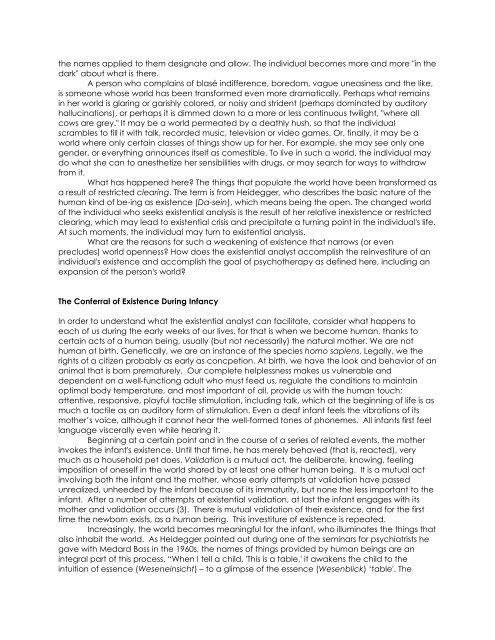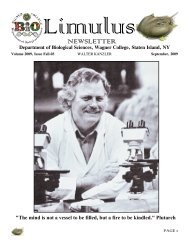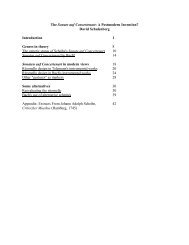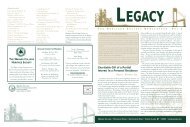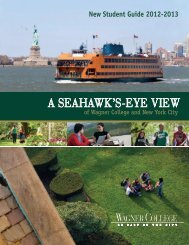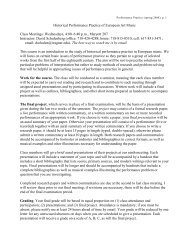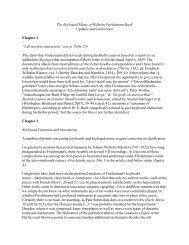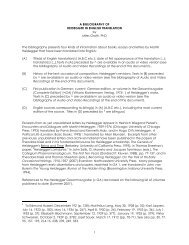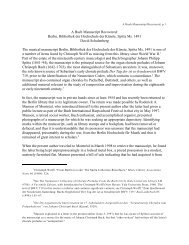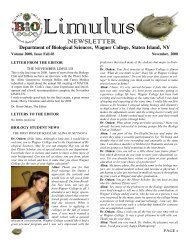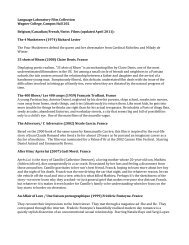SEVEN PAPERS ON EXISTENTIAL ANALYSIS ... - Wagner College
SEVEN PAPERS ON EXISTENTIAL ANALYSIS ... - Wagner College
SEVEN PAPERS ON EXISTENTIAL ANALYSIS ... - Wagner College
Create successful ePaper yourself
Turn your PDF publications into a flip-book with our unique Google optimized e-Paper software.
the names applied to them designate and allow. The individual becomes more and more "in the<br />
dark" about what is there.<br />
A person who complains of blasé indifference, boredom, vague uneasiness and the like,<br />
is someone whose world has been transformed even more dramatically. Perhaps what remains<br />
in her world is glaring or garishly colored, or noisy and strident (perhaps dominated by auditory<br />
hallucinations), or perhaps it is dimmed down to a more or less continuous twilight, "where all<br />
cows are grey." It may be a world permeated by a deathly hush, so that the individual<br />
scrambles to fill it with talk, recorded music, television or video games. Or, finally, it may be a<br />
world where only certain classes of things show up for her. For example, she may see only one<br />
gender, or everything announces itself as comestible. To live in such a world, the individual may<br />
do what she can to anesthetize her sensibilities with drugs, or may search for ways to withdraw<br />
from it.<br />
What has happened here? The things that populate the world have been transformed as<br />
a result of restricted clearing. The term is from Heidegger, who describes the basic nature of the<br />
human kind of be-ing as existence (Da-sein), which means being the open. The changed world<br />
of the individual who seeks existential analysis is the result of her relative inexistence or restricted<br />
clearing, which may lead to existential crisis and precipitate a turning point in the individual's life.<br />
At such moments, the individual may turn to existential analysis.<br />
What are the reasons for such a weakening of existence that narrows (or even<br />
precludes) world openness? How does the existential analyst accomplish the reinvestiture of an<br />
individual's existence and accomplish the goal of psychotherapy as defined here, including an<br />
expansion of the person's world?<br />
The Conferral of Existence During Infancy<br />
In order to understand what the existential analyst can facilitate, consider what happens to<br />
each of us during the early weeks of our lives, for that is when we become human, thanks to<br />
certain acts of a human being, usually (but not necessarily) the natural mother. We are not<br />
human at birth. Genetically, we are an instance of the species homo sapiens. Legally, we the<br />
rights of a citizen probably as early as concpetion. At birth, we have the look and behavior of an<br />
animal that is born prematurely. Our complete helplessness makes us vulnerable and<br />
dependent on a well-functiong adult who must feed us, regulate the conditions to maintain<br />
optimal body temperature, and most important of all, provide us with the human touch:<br />
attentive, responsive, playful tactile stimulation, including talk, which at the beginning of life is as<br />
much a tactile as an auditory form of stimulation. Even a deaf infant feels the vibrations of its<br />
mother’s voice, although it cannot hear the well-formed tones of phonemes. All infants first feel<br />
language viscerally even while hearing it.<br />
Beginning at a certain point and in the course of a series of related events, the mother<br />
invokes the infant's existence. Until that time, he has merely behaved (that is, reacted), very<br />
much as a household pet does. Validation is a mutual act, the deliberate, knowing, feeling<br />
imposition of oneself in the world shared by at least one other human being. It is a mutual act<br />
involving both the infant and the mother, whose early attempts at validation have passed<br />
unrealized, unheeded by the infant because of its immaturity, but none the less important to the<br />
infant. After a number of attempts at existential validation, at last the infant engages with its<br />
mother and validation occurs (3). There is mutual validation of their existence, and for the first<br />
time the newborn exists, as a human being. This investiture of existence is repeated.<br />
Increasingly, the world becomes meaningful for the infant, who illuminates the things that<br />
also inhabit the world. As Heidegger pointed out during one of the seminars for psychiatrists he<br />
gave with Medard Boss in the 1960s, the names of things provided by human beings are an<br />
integral part of this process. “When I tell a child, 'This is a table,' it awakens the child to the<br />
intuition of essence (Weseneinsicht) – to a glimpse of the essence (Wesenblick) ‘table'. The


